英语:Unit2《What is happiness to you?》课件(译林牛津版选修6)
文档属性
| 名称 | 英语:Unit2《What is happiness to you?》课件(译林牛津版选修6) |
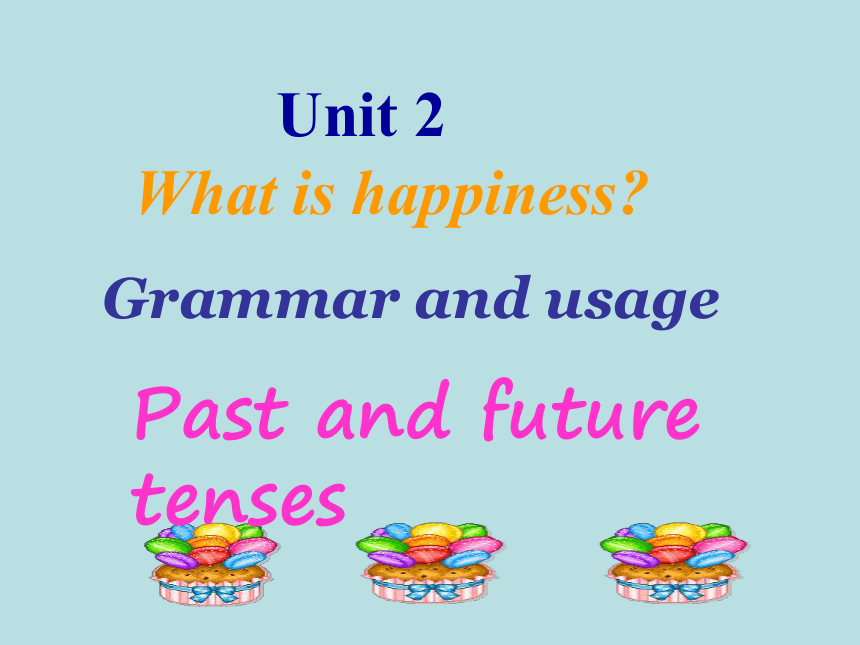
|
|
| 格式 | zip | ||
| 文件大小 | 177.9KB | ||
| 资源类型 | 教案 | ||
| 版本资源 | 牛津译林版 | ||
| 科目 | 英语 | ||
| 更新时间 | 2012-04-10 00:00:00 | ||
图片预览

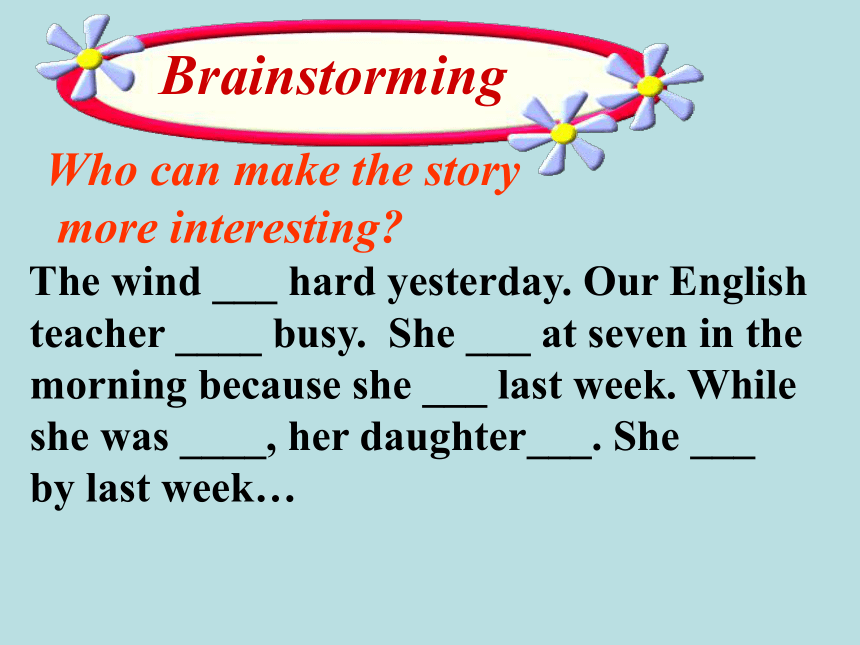
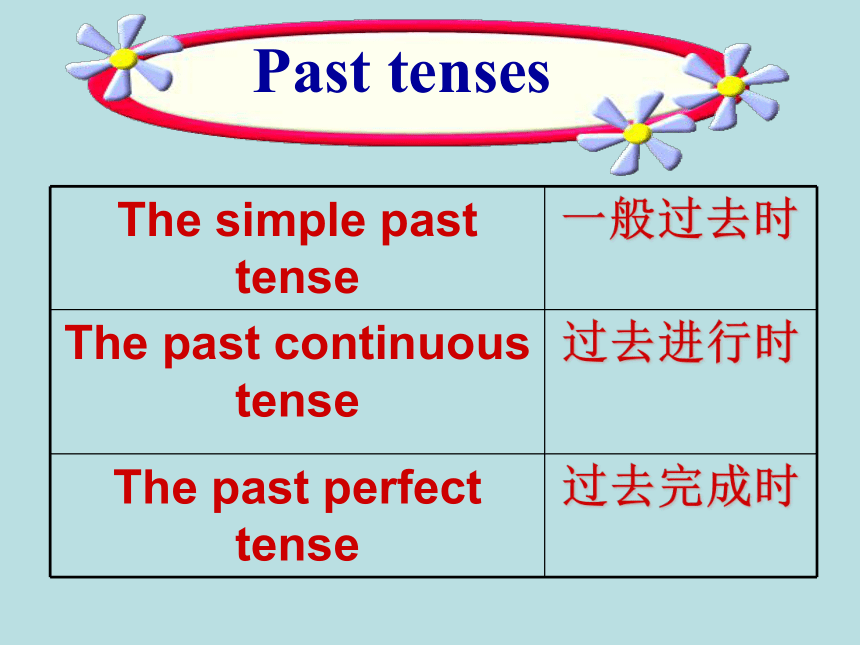

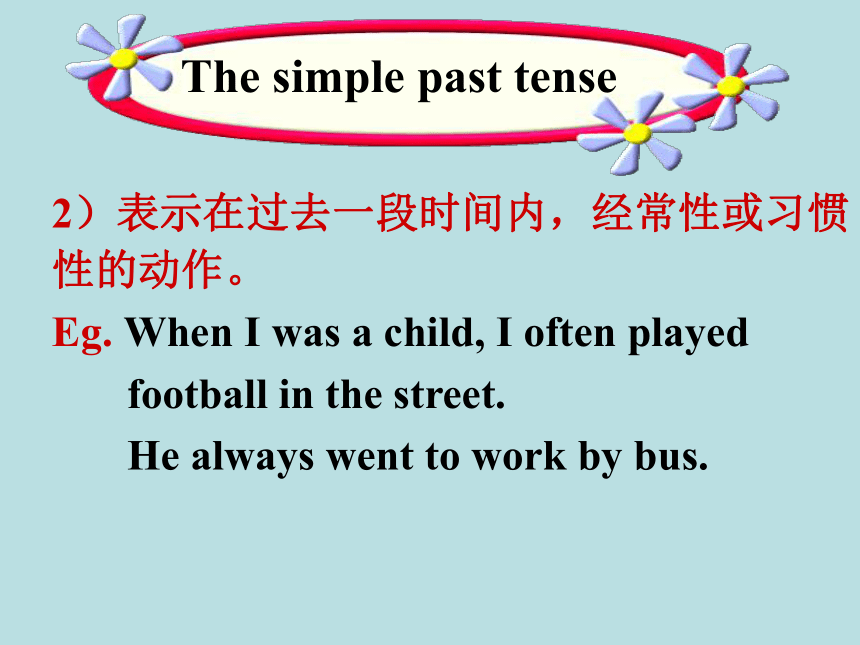
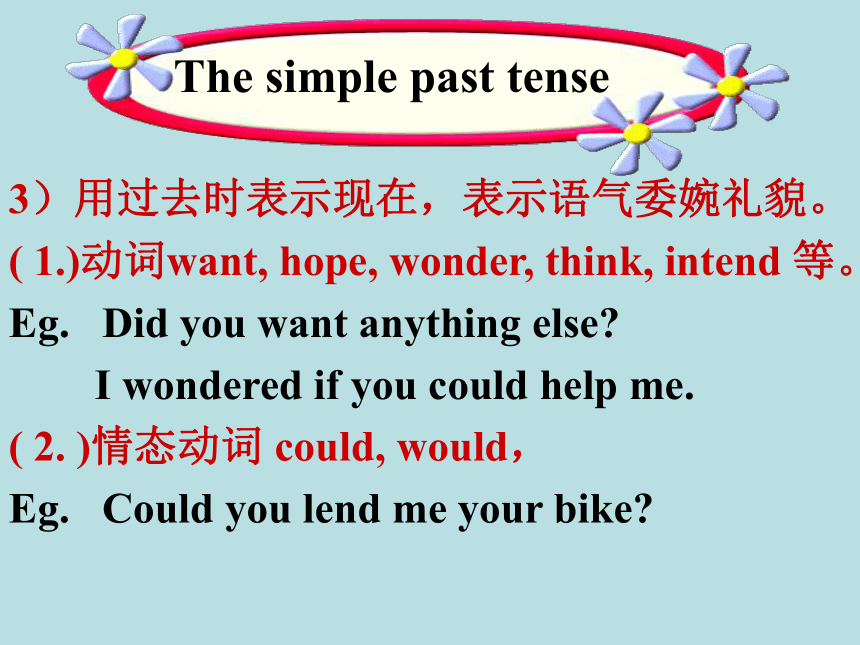

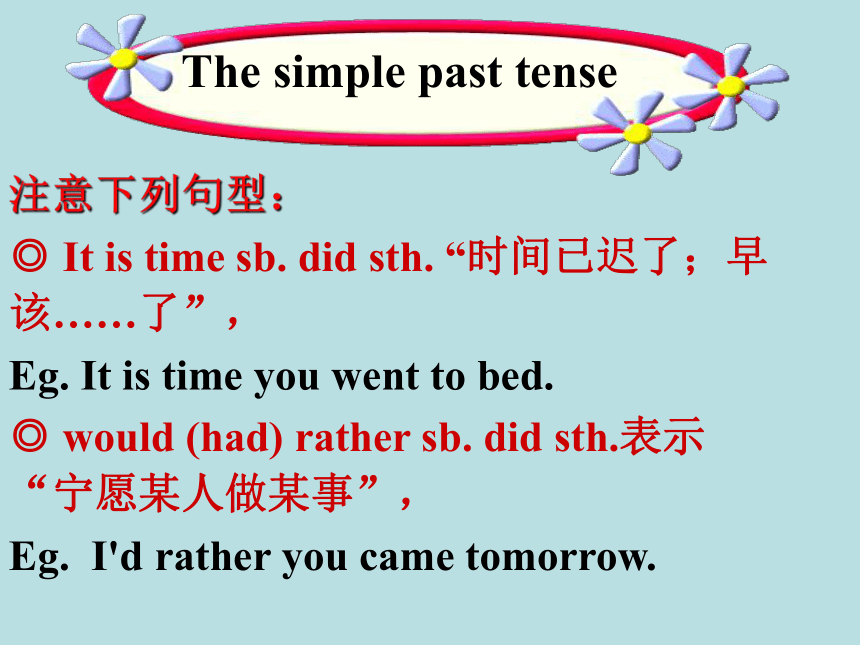
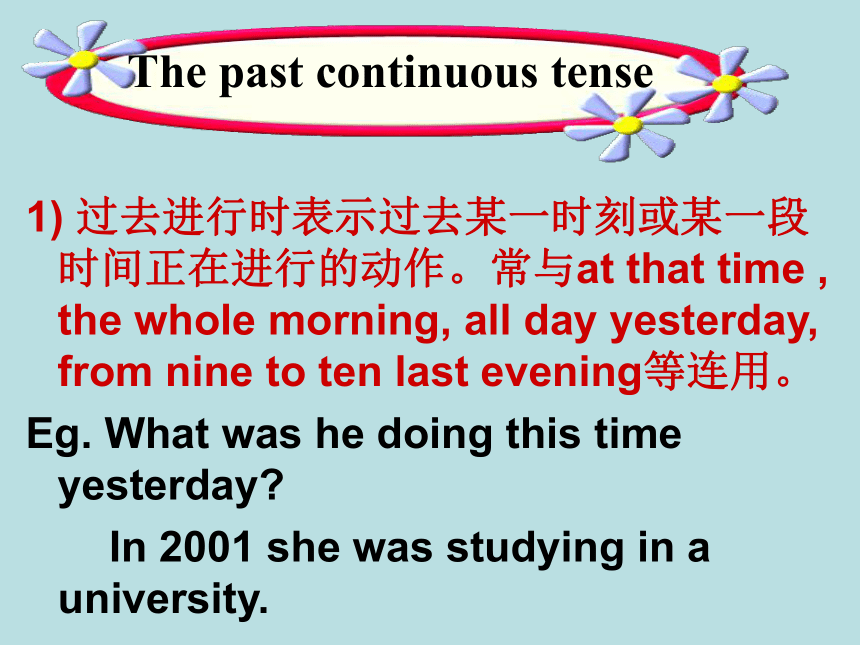
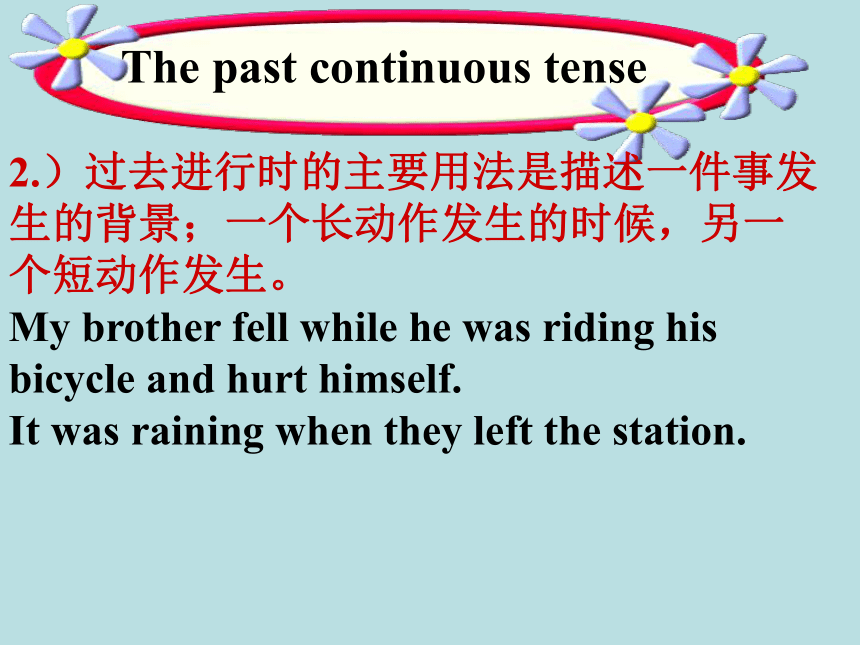
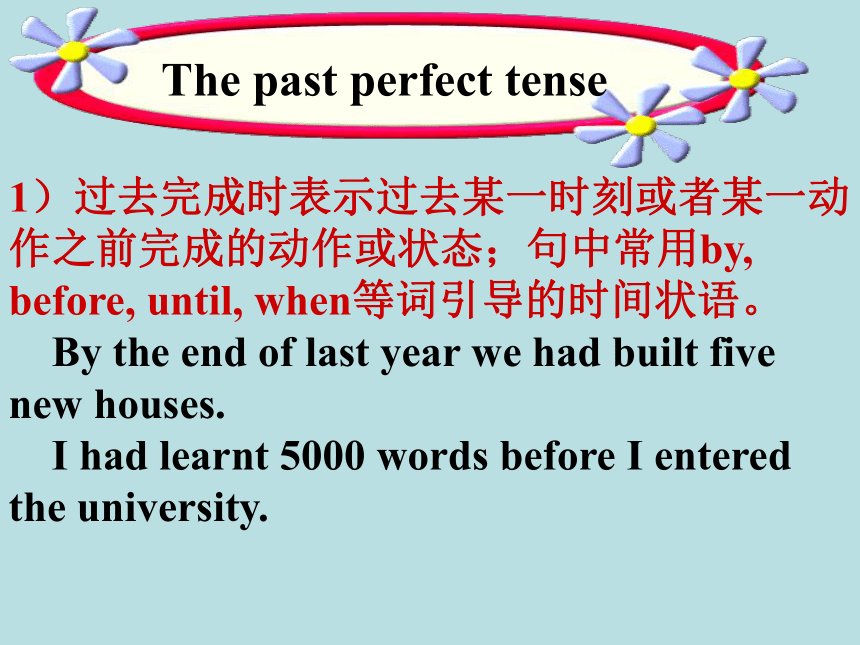
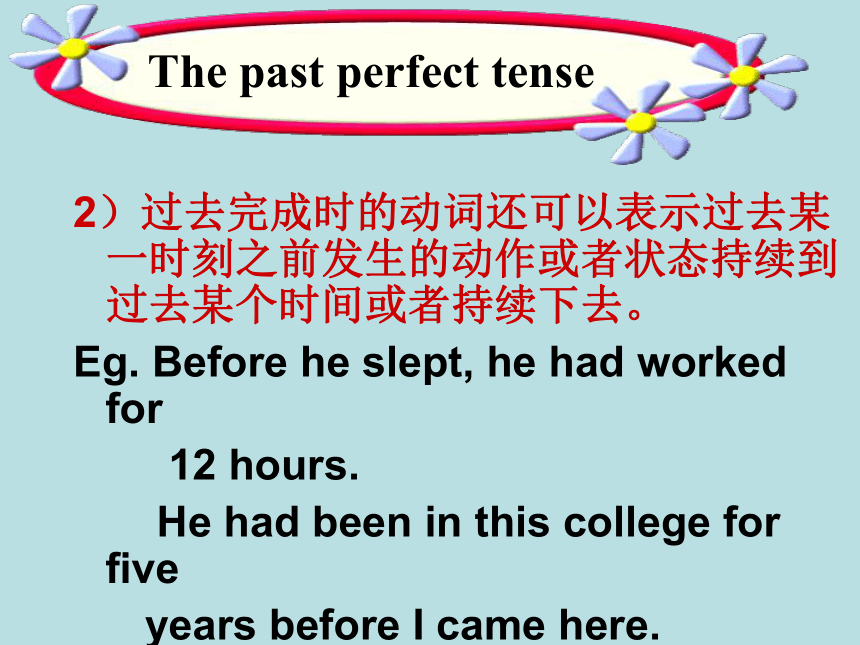
文档简介
(共40张PPT)
Unit 2
What is happiness
Grammar and usage
Past and future tenses
Brainstorming
Who can make the story
more interesting
The wind ___ hard yesterday. Our English
teacher ____ busy. She ___ at seven in the
morning because she ___ last week. While
she was ____, her daughter___. She ___
by last week…
Past tenses
The simple past tense 一般过去时
The past continuous
tense 过去进行时
The past perfect tense 过去完成时
The simple past tense
1)在确定的过去时间里所发生的动作或存在的状态。时间状语有:yesterday, last week, an hour ago, the other day, in 1980 等。
Eg. I saw Tom in the street yesterday.
I bought this TV set in Beijing last year.
2)表示在过去一段时间内,经常性或习惯性的动作。
Eg. When I was a child, I often played
football in the street.
He always went to work by bus.
The simple past tense
3)用过去时表示现在,表示语气委婉礼貌。
( 1.)动词want, hope, wonder, think, intend 等。
Eg. Did you want anything else
I wondered if you could help me.
( 2. )情态动词 could, would,
Eg. Could you lend me your bike
The simple past tense
4)用在条件句中表示与现在或将来事实不符的虚拟语气。
Eg. If I were a bird, I would fly to Beijing.
If he were here now, we could turn to
him for help.
The simple past tense
注意下列句型:
◎ It is time sb. did sth. “时间已迟了;早该……了”,
Eg. It is time you went to bed.
◎ would (had) rather sb. did sth.表示“宁愿某人做某事”,
Eg. I'd rather you came tomorrow.
The simple past tense
1) 过去进行时表示过去某一时刻或某一段时间正在进行的动作。常与at that time , the whole morning, all day yesterday, from nine to ten last evening等连用。
Eg. What was he doing this time yesterday
In 2001 she was studying in a university.
The past continuous tense
The past continuous tense
2.)过去进行时的主要用法是描述一件事发生的背景;一个长动作发生的时候,另一个短动作发生。
My brother fell while he was riding his bicycle and hurt himself.
It was raining when they left the station.
1)过去完成时表示过去某一时刻或者某一动作之前完成的动作或状态;句中常用by, before, until, when等词引导的时间状语。
By the end of last year we had built five new houses.
I had learnt 5000 words before I entered the university.
The past perfect tense
2)过去完成时的动词还可以表示过去某一时刻之前发生的动作或者状态持续到过去某个时间或者持续下去。
Eg. Before he slept, he had worked for
12 hours.
He had been in this college for five
years before I came here.
The past perfect tense
(3)在told, said, knew, heard,
thought等动词后的宾语从句。
She said (that) she had never been to Paris.
(4)在过去不同时间发生的两个动作中,发生在先,用过去完成时;发生在后,用一般过去时。
When the police arrived, the thieves had run away.
The past perfect tense
(5)表示意向的动词,如hope, wish, expect, think, intend, mean, suppose等,用过去完成时表示"原本…,未能…"
We had hoped that you would come, but you didn't.
(6)过去完成时的时间状语before, by, until , when, after, once, as soon as。
By the time he was twelve, Edison had began to make a living by himself.
The past perfect tense
Future tenses
The simple future tense 一般将来时
The future continuous
tense 将来进行时
The future in the past 过去将来时
The future perfect tense 将来完成时
1) shall用于第一人称,常被will 所代替。
will 在陈述句中用于各人称,在征求意见
常用于第二人称。
Eg. Which paragraph shall I read first?
Will you be at home at seven this evening
The simple future tense
2) be going to +不定式,表示将来。
a. 主语的意图,即将做某事或打算做某事。
What are you going to do tomorrow
b. 计划,安排要发生的事。
The play is going to be produced next month.
c. 有迹象要发生的事
Look at the dark clouds; there is going to be a storm.
The simple future tense
3) be +不定式表将来,按计划或正式安排将发生的事。
We are to discuss the report next Saturday.
4) be about to +不定式,意为马上做某事。
He is about to leave for Beijing.
注意:be about to 不能与tomorrow, next week 等表示明确将来时的时间状语连用。
The simple future tense
☆be going to / will的用法之比较:
用于条件句时,be going to表将来,will表意愿。例:
If you are going to make a journey, you'd better get ready for it as soon as possible.
Now if you will take off your clothes, we will fit the new clothes on you in front of the mirror.
The simple future tense
☆be to和be going to 的用法之比较:
be to 表示客观安排或受人指示而做某事。而be going to 则表示主观的打算或计划。
Eg.I am to play football tomorrow afternoon.
(客观安排)
I'm going to play football tomorrow afternoon. (主观安排)
The simple future tense
1.) 表示在将来某一时刻或某段时间正在进行的动作。如:
Eg. This time tomorrow I shall be flying to
Guangzhou.
What will you be doing at eight
tomorrow morning
We'll be watching television all evening.
The future continuous tense
The future continuous tense
2) 表示将来被客观情况所决定的动作或者按照安排将要发生的动作。
Eg. We'll be having tea after dinner as usual.
The leaves will be falling soon.
We shall be having a meeting tomorrow morning.
I’ll be taking my holidays soon.
注意:将来进行时不用于表示"意志",不能说 I'll be having a talk with her.
(3)将来进行时常用的时间状语: soon, tomorrow, this evening,on Sunday, by this time,tomorrow, in two days, tomorrow evening等。
By this time tomorrow, I'll be lying on the beach.
The future continuous tense
基本形式: would/should+动词原形
(其中 would 用于各种人称, should 常用于第一人称)。
They were sure they would win the final victory.
He didn't expect that we should(would)all be there.
The future in the past
过去将来时的一些其它表达形式:
1.was/were+going to+动词原形
He said he was going to try.
2.was/were+to+动词原形
They said the railway was to be opened to traffic on May Day.
The future in the past
3.was/were about+动词原形
We were about to go out when it began to rain.
4.过去进行时(一般多为动作概念较强的动词,如 go,come, leave,start, open,begin 等)也可用于表示将来。
I didn't know when they were coming again.
The future in the past
用法注意点:
1.在时间和条件状语从句中,常用一般过
去时来表示过去将来时。
He said he would come to see you when he
had time.
2.“would+动词原形”可表示过去习惯性的
动作。不管什么人称,都可用would。
When he was a child, he would get up early.
The future in the past
将来完成时用来表示在将来某一时间以前已经完成的动作。与before+将来时间或by+将来时间连用,也可与before或by the time引导的现在时的从句连用。例:
By the end of this week, I shall have finished the book.
The children will have gone to sleep by the time we get home.
The future perfect tense
注意:使用这种时态时,多会涉及两个动作或状态,一个在前,一个在后;叙述前面的动作或状态,动词要用将来完成时;叙述后面的动作或状态,动词要用一般现在时。
We will have completed the work before you come.
We will have played ball when you come.
(或 when you come, we will have played ball.)
He says that he will have graduated from a university before you return home.
The future perfect tense
By the end of this month, we surely ____ a satisfactory solution to the problem.
A. have found B. will be found
C. will have found D. are finding
The conference ____ a full week by the time it ends.
A. must have lasted B. will have lasted
C. would last D. has lasted
The future perfect tense
1. — Look! How wonderful my car is! Oh, Jack. What are you thinking about Don’t you like it
— I’m sorry I ______ any remark about it in time. I certainly think it’s smart.
A. wasn’t making B. don’t make
C. won’t make D. didn’t make
2. To find the street where I lived in my childhood is no easy task because the city ______ so rapidly all these years.
A. is changing B. has changed
C. will have changed D. will change
3. He ______ quite well, but he hasn’t had time to swim since this summer.
A. will swim B. have swum C. swam D. swims
4. Jimmy said that he would come to pick me up, but he ____by now.
A. hasn’t turned up B. doesn’t turn up
C. won’t turn up D. hadn’t turned up
5. I’m terribly sorry for being late, but I _____ the wrong bus.
A. catch B. had caught C. caught D. catching
6. The truth, sir, is that the old man _______ across the road when my car hit him.
A. was to walk B. had been walking
C. walked D. was walking
7. I really don’t think Rose will be upset, but I will go and see her in case she _____.
A. is B. does C. will be D. has been
8. The computers made by our company sell best, but several years ago no one could have imagined the role in the markets that they _________.
A. were playing B. were to play
C. had played D. played
9. — Kate is in hospital.
— Oh, really I _______. ________ visit her.
A. didn’t know; I’ll go and B. don’t know; I’ll go and
C. don’t know; I’m going to D. didn’t know; I’m going to
10. — Where _______ the guidebook I can’t see it anywhere.
— I _______ it right here, but now it’s gone.
A. did you put; have put B. had you put; have put
C. have you put; put D. were you putting; put
11. — Do you live in this city
— No, we ______ it for holidays.
A. just visit B. just visited C. are just visiting D. have visited
12. — How is the old man now
— Sorry, he ______ though they did all they could to save him.
A. was dead B. had died C. has been dead D. died
13.The lake will be further polluted unless some measures ______.
A. will be taken B. are taken C. were taken D. had been taken
14. I’m afraid it will be two months ______.
A. when I come back B. when I’ll come back
C. before I come back D. before I’ll come back
15.The workers _____ busily when the boss came to look for something he ______ in the office.
A. had worked, had left B. were working ; had left
C. working ; had left D. had worked; left
16.The notice ______ “No smoking”.
A. is told B. reads C. tells D. is read
17. The old man _____ two days after he had been sent to hospital.
A. died B. would die C. had died D. has died
18. Old McDonald gave up smoking for a while, but soon ______ to his old ways.
A. returned B. returns C. was returning D. had returned
19. I _____ my son _____ a doctor, but he wasn’t good enough at science.
A. hoped; would become B. had hoped; would become
C. had hoped; will become D. hope; will become
20. I _____ to take a good holiday this year, but I wasn’t able to get away.
A. hope B. have hoped C. had hoped D. hoped
21. Helen _____ her key in the office so she had to wait until her husband _____ home.
A. has left; comes B. left; had come
C. had left; came D. had left; would come
22.He stepped into the office, _____ down and began to fill in the forms.
A. sitting B. to sit C. sat D. having it
23.She said she would telephone but we _____from her so far.
A.haven’t heard B.didn’t hear C.hadn’t heard D.won’t hear
24.When I got to the cinema, the film____for ten minutes.
A.has begun B.had begun C.had been on D.was
25.I’ll go with you as soon as I____my homework.
A.will finish B.finish C.am finishing D.finished
26.If it_____tomorrow,I won’t go to the cinema.
A.will rain B.rains C.is raining D.rained
27.She is going to be a nurse when she_____up.
A.is going to grow B.grows C.growing D.grew
28.“这本书我已经买了三个月了。” which is wrong?
A.I have had this book for three months.
B.I have bought this book for three months.
C.I bought this book three months ago.
D.It is three months since I bought this book.
29.— Come in, Peter, I want to show you something.
— Oh, how nice of you! I _____ you _____ to bring me a gift.
A.never think; are going B.never thought; were going
C.didn’t think; were going D.had’t thought; were going
30.When I was at college I _____ three foreign languages,but I _____ all except for a few words of each.
A.spoke;had forgotten B.spoke;have forgotten
C.had spoken;had forgotten D.had spoken;have forgotten
31.The police found that the house _____ and a lot of things ____.
A.has broken into; has been stolen
B.had broken into; had been stolen
C.has been broken into; stolen
D.had been broken into; stolen
32.The volleyball match will be put off if it____.
A. will rain B. rains C. rained D. is raining
33.Mary _____ a dress when she cut her finger.
A. made B. is making C. was making D. makes
34.The students _____ busily when Miss Brown went to get a book she _____ in the office.
A. had written; left B. were writing; has left
C. had written; had left D. were writing; had left
35. — Have you moved into the new house
— No yet, the rooms _____,
A. are being painted B. are painting
C. are painted D. are being painting
36. — We haven’t heard from Jane for a long time.
— What do you suppose ____ to her
A. was happening B. to happen
C. has happened D. having happened
37. — Do you know our town at all
— No, this is the first time I _____ here.
A. was B. have been C. came D. am coming
38. — We could have walked to the station.It was so near.
— Yes, A taxi _____ at all necessary.
A. wasn’t B. hadn’t been C. wouldn’t be D. won’t be
39.If city noises _____ from increasing, people _____ shout to be heard even at the dinner table 20 years from now.
A. are not kept; will have to B. are not kept; have to
C. do not keep; will have to D. do not keep; have to
40.Tom _____ into the house when no one _____.
A. slipped; was looking B. had slipped; looked
C. slipped; had looked D. was slippping; looked
Unit 2
What is happiness
Grammar and usage
Past and future tenses
Brainstorming
Who can make the story
more interesting
The wind ___ hard yesterday. Our English
teacher ____ busy. She ___ at seven in the
morning because she ___ last week. While
she was ____, her daughter___. She ___
by last week…
Past tenses
The simple past tense 一般过去时
The past continuous
tense 过去进行时
The past perfect tense 过去完成时
The simple past tense
1)在确定的过去时间里所发生的动作或存在的状态。时间状语有:yesterday, last week, an hour ago, the other day, in 1980 等。
Eg. I saw Tom in the street yesterday.
I bought this TV set in Beijing last year.
2)表示在过去一段时间内,经常性或习惯性的动作。
Eg. When I was a child, I often played
football in the street.
He always went to work by bus.
The simple past tense
3)用过去时表示现在,表示语气委婉礼貌。
( 1.)动词want, hope, wonder, think, intend 等。
Eg. Did you want anything else
I wondered if you could help me.
( 2. )情态动词 could, would,
Eg. Could you lend me your bike
The simple past tense
4)用在条件句中表示与现在或将来事实不符的虚拟语气。
Eg. If I were a bird, I would fly to Beijing.
If he were here now, we could turn to
him for help.
The simple past tense
注意下列句型:
◎ It is time sb. did sth. “时间已迟了;早该……了”,
Eg. It is time you went to bed.
◎ would (had) rather sb. did sth.表示“宁愿某人做某事”,
Eg. I'd rather you came tomorrow.
The simple past tense
1) 过去进行时表示过去某一时刻或某一段时间正在进行的动作。常与at that time , the whole morning, all day yesterday, from nine to ten last evening等连用。
Eg. What was he doing this time yesterday
In 2001 she was studying in a university.
The past continuous tense
The past continuous tense
2.)过去进行时的主要用法是描述一件事发生的背景;一个长动作发生的时候,另一个短动作发生。
My brother fell while he was riding his bicycle and hurt himself.
It was raining when they left the station.
1)过去完成时表示过去某一时刻或者某一动作之前完成的动作或状态;句中常用by, before, until, when等词引导的时间状语。
By the end of last year we had built five new houses.
I had learnt 5000 words before I entered the university.
The past perfect tense
2)过去完成时的动词还可以表示过去某一时刻之前发生的动作或者状态持续到过去某个时间或者持续下去。
Eg. Before he slept, he had worked for
12 hours.
He had been in this college for five
years before I came here.
The past perfect tense
(3)在told, said, knew, heard,
thought等动词后的宾语从句。
She said (that) she had never been to Paris.
(4)在过去不同时间发生的两个动作中,发生在先,用过去完成时;发生在后,用一般过去时。
When the police arrived, the thieves had run away.
The past perfect tense
(5)表示意向的动词,如hope, wish, expect, think, intend, mean, suppose等,用过去完成时表示"原本…,未能…"
We had hoped that you would come, but you didn't.
(6)过去完成时的时间状语before, by, until , when, after, once, as soon as。
By the time he was twelve, Edison had began to make a living by himself.
The past perfect tense
Future tenses
The simple future tense 一般将来时
The future continuous
tense 将来进行时
The future in the past 过去将来时
The future perfect tense 将来完成时
1) shall用于第一人称,常被will 所代替。
will 在陈述句中用于各人称,在征求意见
常用于第二人称。
Eg. Which paragraph shall I read first?
Will you be at home at seven this evening
The simple future tense
2) be going to +不定式,表示将来。
a. 主语的意图,即将做某事或打算做某事。
What are you going to do tomorrow
b. 计划,安排要发生的事。
The play is going to be produced next month.
c. 有迹象要发生的事
Look at the dark clouds; there is going to be a storm.
The simple future tense
3) be +不定式表将来,按计划或正式安排将发生的事。
We are to discuss the report next Saturday.
4) be about to +不定式,意为马上做某事。
He is about to leave for Beijing.
注意:be about to 不能与tomorrow, next week 等表示明确将来时的时间状语连用。
The simple future tense
☆be going to / will的用法之比较:
用于条件句时,be going to表将来,will表意愿。例:
If you are going to make a journey, you'd better get ready for it as soon as possible.
Now if you will take off your clothes, we will fit the new clothes on you in front of the mirror.
The simple future tense
☆be to和be going to 的用法之比较:
be to 表示客观安排或受人指示而做某事。而be going to 则表示主观的打算或计划。
Eg.I am to play football tomorrow afternoon.
(客观安排)
I'm going to play football tomorrow afternoon. (主观安排)
The simple future tense
1.) 表示在将来某一时刻或某段时间正在进行的动作。如:
Eg. This time tomorrow I shall be flying to
Guangzhou.
What will you be doing at eight
tomorrow morning
We'll be watching television all evening.
The future continuous tense
The future continuous tense
2) 表示将来被客观情况所决定的动作或者按照安排将要发生的动作。
Eg. We'll be having tea after dinner as usual.
The leaves will be falling soon.
We shall be having a meeting tomorrow morning.
I’ll be taking my holidays soon.
注意:将来进行时不用于表示"意志",不能说 I'll be having a talk with her.
(3)将来进行时常用的时间状语: soon, tomorrow, this evening,on Sunday, by this time,tomorrow, in two days, tomorrow evening等。
By this time tomorrow, I'll be lying on the beach.
The future continuous tense
基本形式: would/should+动词原形
(其中 would 用于各种人称, should 常用于第一人称)。
They were sure they would win the final victory.
He didn't expect that we should(would)all be there.
The future in the past
过去将来时的一些其它表达形式:
1.was/were+going to+动词原形
He said he was going to try.
2.was/were+to+动词原形
They said the railway was to be opened to traffic on May Day.
The future in the past
3.was/were about+动词原形
We were about to go out when it began to rain.
4.过去进行时(一般多为动作概念较强的动词,如 go,come, leave,start, open,begin 等)也可用于表示将来。
I didn't know when they were coming again.
The future in the past
用法注意点:
1.在时间和条件状语从句中,常用一般过
去时来表示过去将来时。
He said he would come to see you when he
had time.
2.“would+动词原形”可表示过去习惯性的
动作。不管什么人称,都可用would。
When he was a child, he would get up early.
The future in the past
将来完成时用来表示在将来某一时间以前已经完成的动作。与before+将来时间或by+将来时间连用,也可与before或by the time引导的现在时的从句连用。例:
By the end of this week, I shall have finished the book.
The children will have gone to sleep by the time we get home.
The future perfect tense
注意:使用这种时态时,多会涉及两个动作或状态,一个在前,一个在后;叙述前面的动作或状态,动词要用将来完成时;叙述后面的动作或状态,动词要用一般现在时。
We will have completed the work before you come.
We will have played ball when you come.
(或 when you come, we will have played ball.)
He says that he will have graduated from a university before you return home.
The future perfect tense
By the end of this month, we surely ____ a satisfactory solution to the problem.
A. have found B. will be found
C. will have found D. are finding
The conference ____ a full week by the time it ends.
A. must have lasted B. will have lasted
C. would last D. has lasted
The future perfect tense
1. — Look! How wonderful my car is! Oh, Jack. What are you thinking about Don’t you like it
— I’m sorry I ______ any remark about it in time. I certainly think it’s smart.
A. wasn’t making B. don’t make
C. won’t make D. didn’t make
2. To find the street where I lived in my childhood is no easy task because the city ______ so rapidly all these years.
A. is changing B. has changed
C. will have changed D. will change
3. He ______ quite well, but he hasn’t had time to swim since this summer.
A. will swim B. have swum C. swam D. swims
4. Jimmy said that he would come to pick me up, but he ____by now.
A. hasn’t turned up B. doesn’t turn up
C. won’t turn up D. hadn’t turned up
5. I’m terribly sorry for being late, but I _____ the wrong bus.
A. catch B. had caught C. caught D. catching
6. The truth, sir, is that the old man _______ across the road when my car hit him.
A. was to walk B. had been walking
C. walked D. was walking
7. I really don’t think Rose will be upset, but I will go and see her in case she _____.
A. is B. does C. will be D. has been
8. The computers made by our company sell best, but several years ago no one could have imagined the role in the markets that they _________.
A. were playing B. were to play
C. had played D. played
9. — Kate is in hospital.
— Oh, really I _______. ________ visit her.
A. didn’t know; I’ll go and B. don’t know; I’ll go and
C. don’t know; I’m going to D. didn’t know; I’m going to
10. — Where _______ the guidebook I can’t see it anywhere.
— I _______ it right here, but now it’s gone.
A. did you put; have put B. had you put; have put
C. have you put; put D. were you putting; put
11. — Do you live in this city
— No, we ______ it for holidays.
A. just visit B. just visited C. are just visiting D. have visited
12. — How is the old man now
— Sorry, he ______ though they did all they could to save him.
A. was dead B. had died C. has been dead D. died
13.The lake will be further polluted unless some measures ______.
A. will be taken B. are taken C. were taken D. had been taken
14. I’m afraid it will be two months ______.
A. when I come back B. when I’ll come back
C. before I come back D. before I’ll come back
15.The workers _____ busily when the boss came to look for something he ______ in the office.
A. had worked, had left B. were working ; had left
C. working ; had left D. had worked; left
16.The notice ______ “No smoking”.
A. is told B. reads C. tells D. is read
17. The old man _____ two days after he had been sent to hospital.
A. died B. would die C. had died D. has died
18. Old McDonald gave up smoking for a while, but soon ______ to his old ways.
A. returned B. returns C. was returning D. had returned
19. I _____ my son _____ a doctor, but he wasn’t good enough at science.
A. hoped; would become B. had hoped; would become
C. had hoped; will become D. hope; will become
20. I _____ to take a good holiday this year, but I wasn’t able to get away.
A. hope B. have hoped C. had hoped D. hoped
21. Helen _____ her key in the office so she had to wait until her husband _____ home.
A. has left; comes B. left; had come
C. had left; came D. had left; would come
22.He stepped into the office, _____ down and began to fill in the forms.
A. sitting B. to sit C. sat D. having it
23.She said she would telephone but we _____from her so far.
A.haven’t heard B.didn’t hear C.hadn’t heard D.won’t hear
24.When I got to the cinema, the film____for ten minutes.
A.has begun B.had begun C.had been on D.was
25.I’ll go with you as soon as I____my homework.
A.will finish B.finish C.am finishing D.finished
26.If it_____tomorrow,I won’t go to the cinema.
A.will rain B.rains C.is raining D.rained
27.She is going to be a nurse when she_____up.
A.is going to grow B.grows C.growing D.grew
28.“这本书我已经买了三个月了。” which is wrong?
A.I have had this book for three months.
B.I have bought this book for three months.
C.I bought this book three months ago.
D.It is three months since I bought this book.
29.— Come in, Peter, I want to show you something.
— Oh, how nice of you! I _____ you _____ to bring me a gift.
A.never think; are going B.never thought; were going
C.didn’t think; were going D.had’t thought; were going
30.When I was at college I _____ three foreign languages,but I _____ all except for a few words of each.
A.spoke;had forgotten B.spoke;have forgotten
C.had spoken;had forgotten D.had spoken;have forgotten
31.The police found that the house _____ and a lot of things ____.
A.has broken into; has been stolen
B.had broken into; had been stolen
C.has been broken into; stolen
D.had been broken into; stolen
32.The volleyball match will be put off if it____.
A. will rain B. rains C. rained D. is raining
33.Mary _____ a dress when she cut her finger.
A. made B. is making C. was making D. makes
34.The students _____ busily when Miss Brown went to get a book she _____ in the office.
A. had written; left B. were writing; has left
C. had written; had left D. were writing; had left
35. — Have you moved into the new house
— No yet, the rooms _____,
A. are being painted B. are painting
C. are painted D. are being painting
36. — We haven’t heard from Jane for a long time.
— What do you suppose ____ to her
A. was happening B. to happen
C. has happened D. having happened
37. — Do you know our town at all
— No, this is the first time I _____ here.
A. was B. have been C. came D. am coming
38. — We could have walked to the station.It was so near.
— Yes, A taxi _____ at all necessary.
A. wasn’t B. hadn’t been C. wouldn’t be D. won’t be
39.If city noises _____ from increasing, people _____ shout to be heard even at the dinner table 20 years from now.
A. are not kept; will have to B. are not kept; have to
C. do not keep; will have to D. do not keep; have to
40.Tom _____ into the house when no one _____.
A. slipped; was looking B. had slipped; looked
C. slipped; had looked D. was slippping; looked
